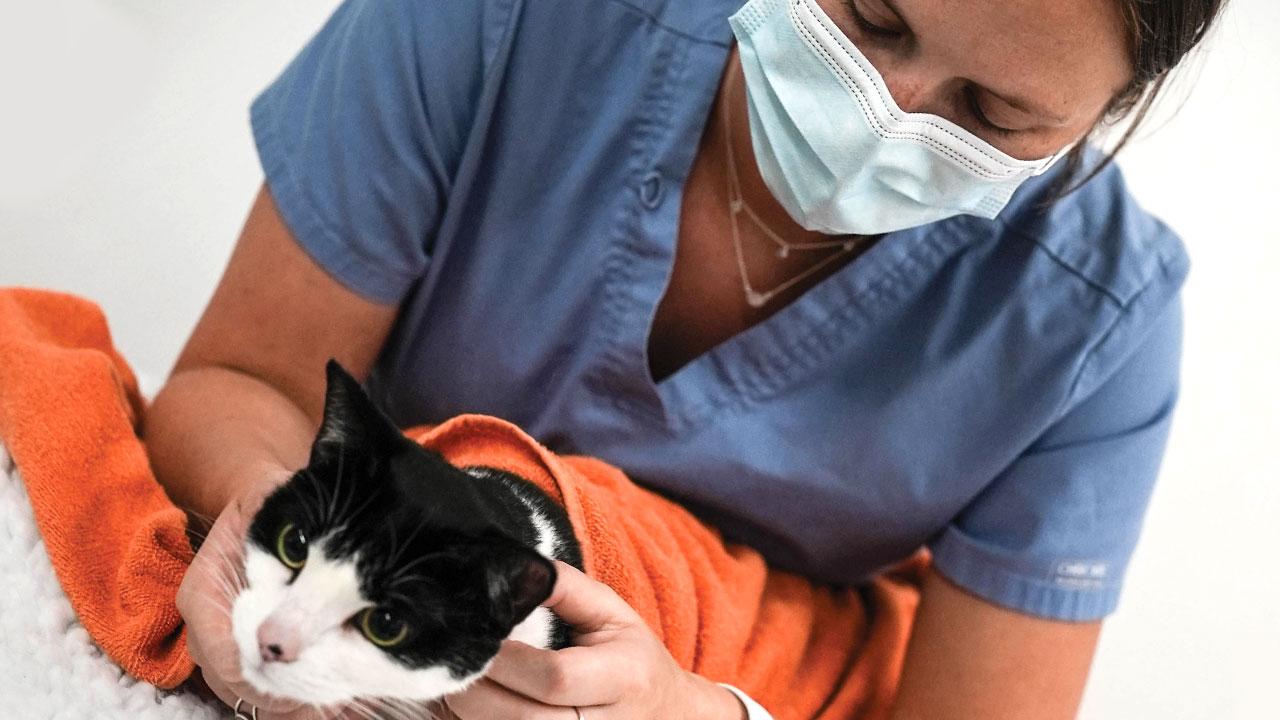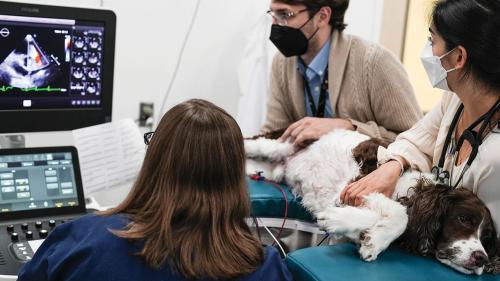
Veterinary Medical Center

Cardiac Care Expands
To meet and optimize the ever- growing need for the most advanced animal healthcare, UC Davis embarked on the Veterinary Medical Center (VMC) campaign several years ago. While many of the VMC projects are focused on new buildings, renovating existing space also plays a major role in the campaign.
With a goal of creating a comprehensive veterinary facility unlike any in the world—one that combines compassionate health care for animals with innovation, discovery, and education—the latest VMC renovation has done just that with the new clinical space for the Cardiology Service and the accompanying Translational Cardiology Clinical Research Center.
The new suite offers an abundance of upgrades to clinical care, student training, and translational research with more than twice the space as the center’s previous location. The service is now able to more efficiently diagnose and treat diseases such as hypertrophic cardiomyopathy (HCM) in cats, dilated cardiomyopathy in dogs, degenerative mitral valve disease (DMVD) in dogs, and congenital defects in puppies and kittens.
One of the most important pieces of equipment for a cardiologist is an echocardiography machine, which is used to ultrasound an animal’s heart and help diagnose conditions and grade their severity. The new suite offers more space for each of the two machines and their specially designed patient tables, one of which can now be curtained off as a quiet space for cats. An adjacent treatment area allows for added space to perform diagnostics such as electrocardiograms, blood pressure measurements, and blood draws.
This larger footprint helps keep the service’s busy caseload on time and keeps patient comfort high and stress levels low. An improved kennel space allows clinicians and technicians to keep a close eye on day patients, and its proximity to the nearby Cardiac Catheterization Laboratory and the future All Species Imaging Center will improve patient safety. Additionally, two dedicated cardiology examination rooms are located next to the suite.
Students are seeing an immediate benefit from the new space in many ways. The service’s two echocardiography areas now have large overhead monitors which allow for easier viewing of the case as well as the ability to allow more students to observe a procedure. An added treatment area gives students a dedicated workspace, and a new, larger conference room nearby offers space for breaks and room for faculty and residents to host rounds.
Cardiology care at UC Davis is heavily supported by the research of its faculty and residents. The new Translational Cardiology Clinical Research Center, in conjunction with the Stern Genetics Laboratory, is helping to advance the cardiologists’ abilities to take a research question and translate it to a clinical study. This benchtop to bedside model of translational research is a hallmark of the VMC and is evident in the new cardiology center.
The additional space in the new suite allows for clinical trials and other research projects to be carried out without disrupting regular patient flow. Current initiatives in this area include Dr. Joshua Stern assessing a novel drug therapy for HCM, Dr. Marisa Ames researching genetic variations in dogs with DMVD, and Dr. Allison Gagnon analyzing the cardiac effects of a stress reducing drug given prior to an echocardiogram.
The hospital’s esteemed cardiology residency training program is also benefitting from this new space. The cardiology residency recently added a fourth year to its advanced training model, with the residents focusing mostly on research during their first year of residency. Drs. Ashley Sharpe and Laetitia Duler recently completed prospective clinical trials that will impact standard of care. Both were presented at the American College of Veterinary Internal Medicine’s annual conference with Sharpe’s research of the safety and efficacy of a blood pressure reduction drug on dogs with congestive heart failure winning the Cardiology Research Abstract Award.
